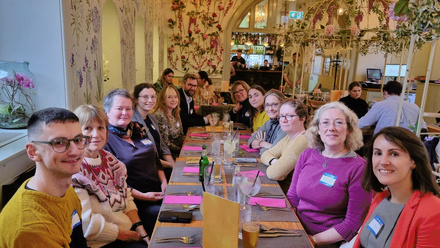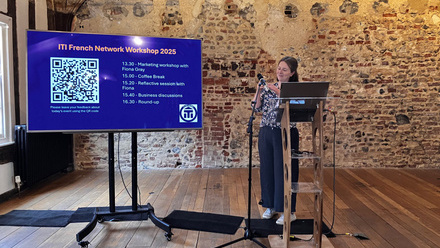Language/cultural exchange: How Bastille Day 14 July became ‘Franglais Day’ in a ‘contre-soirée’
14 July, Brussels: Whilst much of France was celebrating the fall of the Bastille and the end of the autocracy of the monarchy, the Press Club in Brussels kindly hosted us (mainly members of the Chambre belge des traducteurs et interprètes (CBTI)/Institute of Translation and Interpreting (ITI) network but also other language aficionadoes) for a fun ‘franglais’ event moderated by Julian Hale.
As explained by one of our group, meeting in petit comité (nous étions une dizaine) that evening, a ‘contre-soirée’ is also when, if someone’s holding a party (remember le film ‘La Boum’ avec Sophie Marceau!), a group move into the kitchen for a ‘side party’.
In an evening full of linguistic nuances, cultural insights and the odd ‘boutade’ (rejoinder, quip, witty remark) which the Anglophile raconteur (one of many French words the English have adopted) Voltaire would, I like to think, have enjoyed, we decided to switch between English and French. We dipped into the history of how French entered the English language (via the Normans and the Norman conquest in 1066), looked at differences between French and English (a highly linguistically protective Academie Française vs no English academy (the English are insouciant in this regard); the French ‘quart d’heure académique’ vs no equivalent in English; the abundance of ‘bises’, including a ‘bises map of France’ vs the lack of ‘bises’ in the UK; expressions like ‘tu as les chevilles qui gonflent’ vs ‘you’re too big for your boots’). I also used a photo collage (another English borrowing from French as ‘coller’ means ‘to stick, glue’) of French icons from the worlds of sport, royalty and popular culture to illustrate a few points. We began with why ‘Honni soit qui mal y pense’ is on British passports (NB you’ll have to come and meet us at a future event to find out this and other ‘Franglaisisms’)…
The famous Anglophile and 18th century philosopher/salon comedian/anti-autocrat hero Voltaire also featured. I read a short passage from Candide in which he makes fun of the philosophy of ‘Optimism’ by using its slogans to describe the amorous activities of the philosopher Pangloss with Cunégonde. And there were plenty of fascinating contributions from each of the guests, with one referring to the French fad for adding ‘ing’ to words as if that then makes them English. Faire le footing (go jogging) and le relooking (a makeover) were among the examples. A Belgian guest was not a fan of the Belgian proclivity (penchant if you like) to use English words in French where French equivalents exist (e.g. ‘forwarder un mail’ instead of ‘transmettre un courriel’).
A conclusion: In times of sometimes excessive nationalism, why not hold more events about exchanging between nations/languages? Why not hold a ‘Franglais Day’ every year, perhaps not on 14 July but maybe on the day Britain and France signed the Entente Cordiale (8 April 1904) or the day of the opening of the Eurotunnel (6 May 1994) or a day between Wimbledon and Roland Garros (the French Open as we Brits call it)?
If this kind of thing flicks your switches (fait votre bonheur), join Julian Hale’s Whatsapp group by emailing him your phone number ([email protected]) so that you can hear about monthly events covering different languages. Upcoming are ones on Russian, Arabic, German, Spanish, Italian and more… Volunteer speakers are welcome too.
Stay also tuned for more RAF (read: ‘réseau anglo-français’) events at the CBTI, in synergy with the ITI. Full details can be found here.






